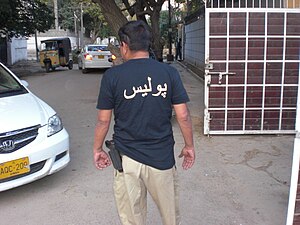Law enforcement in Pakistan
This article needs additional citations for verification. (September 2010) |


Law enforcement in Pakistan (Template:Lang-ur) is one of the most elite and prestigious cadre of the Civil Service of Pakistan.[1][2][3] One of the three main components of the criminal justice system of Pakistan, alongside the courts and the prisons.[3][2] The service of PSP is very versatile in nature and officers are assigned to different districts/Provinces/Stations all across Pakistan during the course of their careers. Many of the country's highest profile positions such as Inspector Generals/ PPO’s of Provinces and DG Intelligence Bureau, DG FIA & also Superidentents of FC & NH&MP & Many other important Police Designations usually belong to the elite Police Service of Pakistan, PSP. Officers in this group are recruited through an extremely high competitive examination held once a year by the Federal Public Service Commission. Those selected for this group have to undergo Six Months training programme Known as CTP at the Civil Services Academy (CSA) in Lahore, and then there Remaining Police Training Program Initial Command Course (ICC) is Specialized Training Programme (STP) designed for the new entrants of Police Service of Pakistan (PSP) officers which is spread over 18 months is Done at National Police Academy Islamabad. In Pakistan law enforcement is jointly carried out by the federal and provincial police services and other law enforcement agencies who form a chain leading from investigation of suspected criminal activity to administration of criminal punishment.[4][5] The court system is vested with the power to make legal determinations regarding the conduct of the other two components.[2][6][7]
Primarily operated through the four provincial governments and the Islamabad Capital Territory,[8] each police service has a jurisdiction extending only within the relevant province or territory.[9] Apart from investigating crime scenes, criminal acts, suspected unlawful activities, and detention of suspected criminals pending judicial action, the law enforcement agencies (primarily police) also perform duties that include the service and enforcement of warrants, writs, and other orders of the courts.[5] The law enforcement agencies are also involved in providing first response to emergencies and other threats to public safety as well as protecting the infrastructure and maintaining order in the country. At the federal level there are a number of law enforcement agencies including the Federal Investigation Agency, Federal Board of Revenue, Intelligence Bureau, Anti Narcotics Force, National Counter Terrorism Authority, Pakistan Federal Police, Pakistan Armed Police, the National Highways and Motorway Police and the Railways Police.[5] The four provinces each have their own police services such as the Punjab Police, Khyber Pakhtunkhwa Police, Sindh Police, Balochistan Police. The Khyber Pakhtunkhwa Police services are supported by paramilitary units such as the Frontier Constabulary and Frontier Corps.[5] Each police force has a Commissioner of Police appointed as Inspector-General who is the most senior officers from the Police Service of Pakistan— a component of the Central Superior Services of Pakistan.[10][11]

Designations of PSP officers
| Grade | Police Ranks | Directorial/Secretarial Appointment |
|---|---|---|
| BPS-17 |
|
|
| BPS-18 |
|
|
| BPS-19 |
|
|
| BPS-20 |
|
|
| BPS-21 |
|
|
| BPS-22 |
|
|
|
|
See also
- List of law enforcement agencies in Pakistan
- Federal Security Force, a defunct law enforcement agency
- Paramilitary forces of Pakistan
- List of cases of law enforcement brutality in Pakistan
- Crime in Pakistan
- National Police Academy of Pakistan
- Organised crime in Pakistan
- Punjab Police (Pakistan)
- Sindh Police
References
- ^ "empowering-the-pakistan-police;hr". Human Rights Documents online. Retrieved 2021-01-04.
- ^ a b c Hassan, Abbas (2011). "Reforming Pakistan's Police and Law Enforcement Infrastructure". www.usip.org/. U.S. Institute of Peace. Archived from the original (PDF) on 4 March 2016. Retrieved 5 March 2015.
- ^ a b Manzoor, Saima; Manzoor, Akif; Manzoor, Asif (2014). Police in Pakistan. U.S.: Lulu publications. ISBN 110599032X. Retrieved 5 March 2015.
- ^ Qadeer, M. A. (October 1970). "Pakistan Perspective". Pakistan Forum. 1 (1): 3. doi:10.2307/2568962. ISSN 0315-7725.
- ^ a b c d "Our Partners". National Police Bureau, Government of Pakistan. Archived from the original on 2012-01-18. Retrieved 2008-07-01.
- ^ Shigri, Afzal Ali (2020-12-19). "Politics of police reform". DAWN.COM. Retrieved 2020-12-22.
- ^ Desk, BR Web (2020-12-22). "Police report reveals 122 people killed in Islamabad this year". Brecorder. Retrieved 2020-12-22.
{{cite web}}:|last=has generic name (help) - ^ Mumtaz, Kamil Khan (2003), "Islamabad", Oxford Art Online, Oxford University Press, retrieved 2021-01-04
- ^ Abbas, Hassan. "Police Reforms in Pakistan" (PDF). ispu.org. Hassan Abbas, special report published by USIP. Archived from the original (PDF) on 2015-04-02. Retrieved 5 March 2015.
- ^ Jones, Mark; Johnstone, Peter (2011). "Time Capsule: Policing in pakistan". History of Criminal Justice (google books). New York, U.S.: Routledge. ISBN 131752246X. Retrieved 5 March 2015.
- ^ National Police Academy of Pakistan
